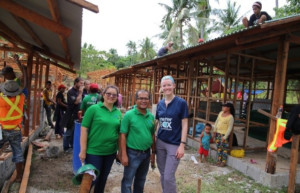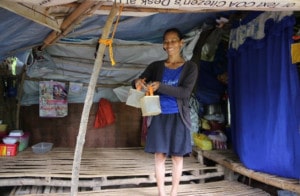By Rotary Service and Engagement, November 14, 2018, Published in Rotary International
ShelterBox and Rotary International are Project Partners in Disaster Relief. By working together, we are ensuring that no family is left without shelter after disaster. Not only do Rotary and Rotaract clubs around the world support ShelterBox financially, but on many of ShelterBox’s deployments local Rotarians, Rotaractors and Response Teams work closely together at an operational level. Rotarians often have great connections with communities and authorities that can help response teams understand the situation and respond better together.
Recently, in the Philippines, ShelterBox and Rotary have taken this partnership to the next level. ShelterBox has deployed disaster responses in the Philippines on twenty-five separate occasions. To innovate our responses, ShelterBox Operations Philippines was set-up as an in-country organization with aid stored locally so that we can respond more effectively.

ShelterBox Tents in Almeria
Dave Ray, Horizon’s Lead at ShelterBox said:
“Rotary has been involved in the creation of the new agency in the Philippines since way before its actual invention. We have worked with Rotarians on all of our responses in the past so it is a very natural thing for us to go to Rotarians and ask for their advice when we were beginning the process.”
ShelterBox Operations Philippines, a locally registered ShelterBox office, was set up with a plan to create a network of local Rotarian Coordinators. In this way, when a disaster hits in the Philippines, our response can begin almost immediately.
When Tropical Storm Urduja hit the Philippines it caused flash flooding, landslides and destruction. The Rotary Club of Biliran Island started their response shortly after the storm passed by providing food, water, and health kits. They were quickly in contact with the local Rotarian Coordinators who coordinated with ShelterBox HQ Operations and the in-country Response team, who then started the ShelterBox Operations Philippines response.
The Club also began planning for a Village Project, which would give transitional housing to sixty families. Dindin Morillo, Past President of the Rotary Club of Biliran Island said:
“Although we had already identified the next phase of the response for transitional shelter solutions, ShelterBox’s timely arrival provided emergency shelters and rebuilding tools which we recognized as an immediate solution. Without ShelterBox it would have taken time to find interim shelter solutions.”
As families were sleeping in crowded schools and public buildings, without adequate space, privacy or supplies, having immediate emergency shelter was very important. Fifty-seven families were provided with ShelterBox tents as well as blankets, mosquito nets, solar lights, kitchen sets, tool kits, water carriers and more. A further nine hundred families received ShelterKits to start rebuilding their homes as well as blankets, solar lights, mosquito nets, and water carriers. The Rotary Club of Biliran Island was instrumental in the distribution of this vital aid, as their local knowledge insured ShelterBox could reach the most remote and most vulnerable families.

Dindin Morillo, Anna Dixie, Greg Pastor and Jane Diu at the Almeria Tent Site.

Enisa with her solar lights
Greg Pastor is the President of the Rotary Club of Biliran Island. Of the partnership between ShelterBox and the Rotary Club of Biliran Island, Greg said:
“ShelterBox’s response to Tropical Storm Urduja sets the bar on the level of relief operations and assistance for affected families. The kind of assistance ShelterBox gave to the affected families prepares us to plan and implement the Rotary Village Project as continuing support for these families. Because of honest and genuine service, ShelterBox and Rotary were able to deliver effective and swift assistance to affected families.”
This response was made more effective because ShelterBox Operations Philippines was in place, so aid was already stored in the Philippines, and we were able to start the response immediately. Dindin Morillo said:
“ShelterBox extended help that meets the needs of the people. We Rotarians, especially those on Biliran Island, have local knowledge of whom to help, including who to talk to in order to bring the help in a timely manner. Thus, rather than being sucked into bureaucratic processes, working together expedited the help and we are very thankful.”
While this alone is a great example of how effective the partnership between ShelterBox and Rotary can be at immediately responding to disasters with high quality emergency shelter aid, we were able to take the partnership one step further on this response.
The Village Project run by the Rotary Club of Biliran Island involved legally procuring land, construction of sixty transitional shelters, hands-on training, and legal ownership documentation for families receiving the homes. Families were provided with technical training through TESDA (Technical Education and Skills Development Authority) to build their homes. In this way, not only will they have a safe place to live, but they also will have accredited training and a certificate which can help them gain employment in construction.
The Rotary Club of Biliran Island helped secure the land and provided the funding for the materials. ShelterBox was able to provide the roofing sheets for one of the Village sites, further strengthening our partnership while helping families recover.
Disaster recovery is a process. When ShelterBox and Rotary work together after disasters, having ShelterBox’s technical expertise and Rotary’s community connections and knowledge side by side means that families are given the best tools and support that they need through each step of the process to recover and rebuild.

Leave A Comment
You must be logged in to post a comment.